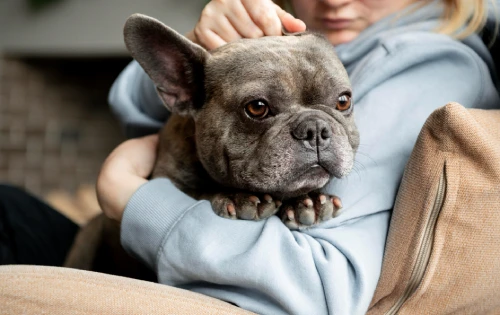Anxious dogs can experience significant disruptions in their daily lives and behavior due to anxiety. You might’ve noticed your furry friend showing signs of distress during thunderstorms or when left alone. Understanding how anxiety manifests in dogs is crucial for providing them with the best care and comfort.
Anxiety in dogs can stem from various factors, ranging from separation anxiety to traumatic experiences. It’s not just about a scared pup hiding under the bed; anxiety can lead to long-term health issues if not addressed.
Let’s dive into the impacts of anxiety on dogs and what you can do to help your four-legged companion.
Understanding anxiety in dogs
The Signs and Symptoms of Anxiety in Dogs
To effectively support your anxious dog, it’s vital to recognize the signs they might show. Anxiety can manifest through various behaviors and physical responses. Keep an eye out for:
- Excessive barking or howling when left alone
- Pacing, trembling, or excessive licking
- Destruction of furniture or personal items
- Attempts to escape the house or yard
- Changes in appetite or bathroom habits
- Compulsive behaviors, such as tail chasing
These symptoms may not be immediately obvious, but once you know what to look for, you’ll be better equipped to help your furry friend.
Common Causes of Anxiety in Dogs
Several reasons can trigger anxiety in dogs. Understanding these can help you pinpoint why your dog is stressed and create a tailored comfort plan. Common triggers include:
- Separation from you or their human family
- Traumatic events, such as abuse or accidents
- Lack of socialization during their puppy years
- Changes in their environment or routine
- Aging-related cognitive decline
- Underlying health problems
Keeping a close watch on your dog’s behavior and environmental changes can give you clues to their anxiety triggers.
The Impact of Anxiety on a Dog’s Health and Well-being
Being able to identify an anxious dog’s behaviors is just part of the picture—understanding how it affects their health and well-being is crucial for their care.
Physical Effects of Anxiety on Dogs
Anxiety doesn’t just affect your dog’s mood; it has tangible physical effects. Here’s how it can manifest:
- Elevated Heart Rate: The stress response in dogs can lead to a faster heart rate, which, over time, may strain the cardiovascular system.
- Digestive Issues: Symptoms like diarrhea or vomiting can occur when a dog feels stressed or anxious.
- Decreased Immune Function: Chronic anxiety can suppress immune responses, making your dog more susceptible to illnesses.
- Panting and Shaking: These are immediate physical reactions to stress that can occur in anxious canines.
- Decreased Appetite: Stress can lead to a loss of appetite, impacting a dog’s nutritional intake and overall health.
Behavioral Changes Associated with Anxiety in Dogs
Behavior can significantly shift when a dog experiences anxiety. Stay alert for these modifications in their demeanor:
- Excessive Barking: This could be your furry friend’s cry for help or an attempt to self-soothe.
- Avoidance or Hiding: An anxious dog may seek isolation away from stressors or perceived threats.
- Pacing: A clear sign of restlessness and unease, indicating something is amiss.
- Destruction: Chewing and digging are often outlets for anxious energy in dogs.
Keep tabs on these signals and consult with a vet for ways to alleviate your pet’s distress. Your awareness and quick action can make a world of difference to an anxious dog.

Anxiety in Dogs
How Anxiety Affects a Dog’s Daily Life
Challenges with Eating and Drinking
When your dog is anxious, you’ll often notice a shift in their eating and drinking habits. Anxious dogs might skip meals or nibble at their food instead of eating with their usual vigor.
They may also ignore their water bowls, which can lead to dehydration, particularly in warmer climates or during the summer months. Monitoring these patterns is important as they can significantly impact your pet’s health.
- Observe your dog’s mealtime behavior
- Ensure easy access to fresh water
- Consult a vet if appetite changes persist
Difficulties with Socialization and Bonding
Anxiety can take a heavy toll on your dog’s ability to socialize and bond with both humans and other pets. An anxious dog may display reluctance or aggression when approached, making interactions stressful. This behavioral change can strain existing relationships and hinder the development of new ones, leaving your dog isolated.
- Watch for signs of anxiety during play
- Introduce new faces and pets gradually
- Foster a calm environment for better interactions
Problems with Sleep and Rest
Anxiety can disrupt a dog’s sleep patterns. A restful night’s sleep ensures your dog can recover from the day’s activities and maintain optimal health. However, an anxious dog might spend the night pacing, whining, or exhibiting restlessness, which not only affects its well-being but may disturb your sleep too.
- Create a comfortable sleeping area
- Stick to a consistent bedtime routine
- Seek advice on calming techniques if sleep issues arise
An understanding of how anxiety affects your dog’s daily life will help you create a supportive environment that caters to its emotional and physical needs.
Helping Dogs Cope with Anxiety
Dealing with an anxious dog requires a compassionate approach and solid strategies. Your focus should be on fostering a sense of security while simultaneously addressing the triggers of anxiety.
Here’s how you can help your furry friend navigate through their nervousness.
Behavioral Training Techniques for Anxiety in Dogs
Behavioral training plays a crucial role in managing anxiety in dogs. These techniques aim to modify your dog’s reaction to stress-inducing situations:
- Desensitization: Gradually expose your dog to the source of anxiety in controlled, tolerable doses while providing positive reinforcement.
- Counter-Conditioning: Change your dog’s response to anxiety triggers by associating the feared object or scenario with something good, like treats or playtime.
- Obedience Training: A well-trained dog is easier to manage. Simple commands like ‘sit’ or ‘stay’ can regain your dog’s focus during anxious episodes.
Consistency is an important factor in behavioral training, so practice regularly and be patient as your dog learns to cope with their anxiety.
The Use of Medications and Supplements for Managing Anxiety in Dogs
In some cases, behavioral techniques need to be combined with medical interventions. Here’s what might be recommended:
- Prescription Medications: These can include antidepressants or anti-anxiety drugs prescribed by your vet.
- Natural Supplements: Options like Chamomile or L-theanine can help alleviate anxiety symptoms without the side effects of prescription meds.
- Pheromone Products: Products like diffusers or collars can release calming chemicals that mimic those produced by mother dogs to soothe their puppies.
Consult your vet before starting your dog on any medications or supplements, as they can advise the most suitable options for your anxious dog.
Creating a Calm and Safe Environment for Anxious Dogs
Your dog’s environment can greatly influence their anxiety levels. You can create a calming space with the following suggestions:
Safe Zone: Set up a quiet area where your dog can escape from stressors, like a cozy crate with their favorite toy.
Consistent Routine: Dogs thrive on routine, which can be comforting for those with anxiety.
Reduced Noise: Limit loud noises that may startle your dog or use white noise machines to mask disruptive sounds.
Aromatherapy: Certain scents, like lavender, can have a calming effect on some dogs.
By integrating these tactics, you’re not just combating anxiety but cultivating a balanced lifestyle that supports your dog. Your efforts will go a long way in helping your anxious dog feel more secure in their day-to-day life.
Final Thoughts
Addressing your dog’s anxiety isn’t just about immediate relief—it’s about enhancing their quality of life. You’ve got a toolkit at your disposal, from behavioral training to creating a soothing environment.
It’s about patience, understanding, and consistent care. Remember, your commitment to your furry friend’s mental health can transform their world, ensuring they live a happier, more balanced life alongside you.
So take these steps to heart and watch as your dog’s anxiety becomes manageable, allowing them to thrive in a world that once seemed overwhelming.
Frequently Asked Questions
What are the main causes of anxiety in dogs?
Anxiety in dogs can stem from various causes such as separation from their owners, fear of loud noises, changes in environment, or traumatic experiences.
Can behavioral training help an anxious dog?
Yes, behavioral training techniques like desensitization, counter-conditioning, and obedience training can be very effective in helping dogs manage their anxiety.
Are there medications available for dogs with anxiety?
Yes, there are prescription medications that vets can prescribe for dogs with anxiety. Always consult with a veterinarian before starting any medication.
What natural supplements can help dogs with anxiety?
Natural supplements such as L-Theanine, valerian root, and chamomile are known to help dogs with anxiety, but it’s important to check with a vet first.
How can creating a safe environment help an anxious dog?
Creating a calm and safe environment with a dedicated safe zone, consistent routine, reduced noise, and possibly aromatherapy can significantly help ease a dog’s anxiety.
Is it important to integrate different tactics to help a dog with anxiety?
Yes, integrating various tactics such as behavioral training, medication, supplements, and environmental changes can better support a dog’s well-being and reduce anxiety effectively.








